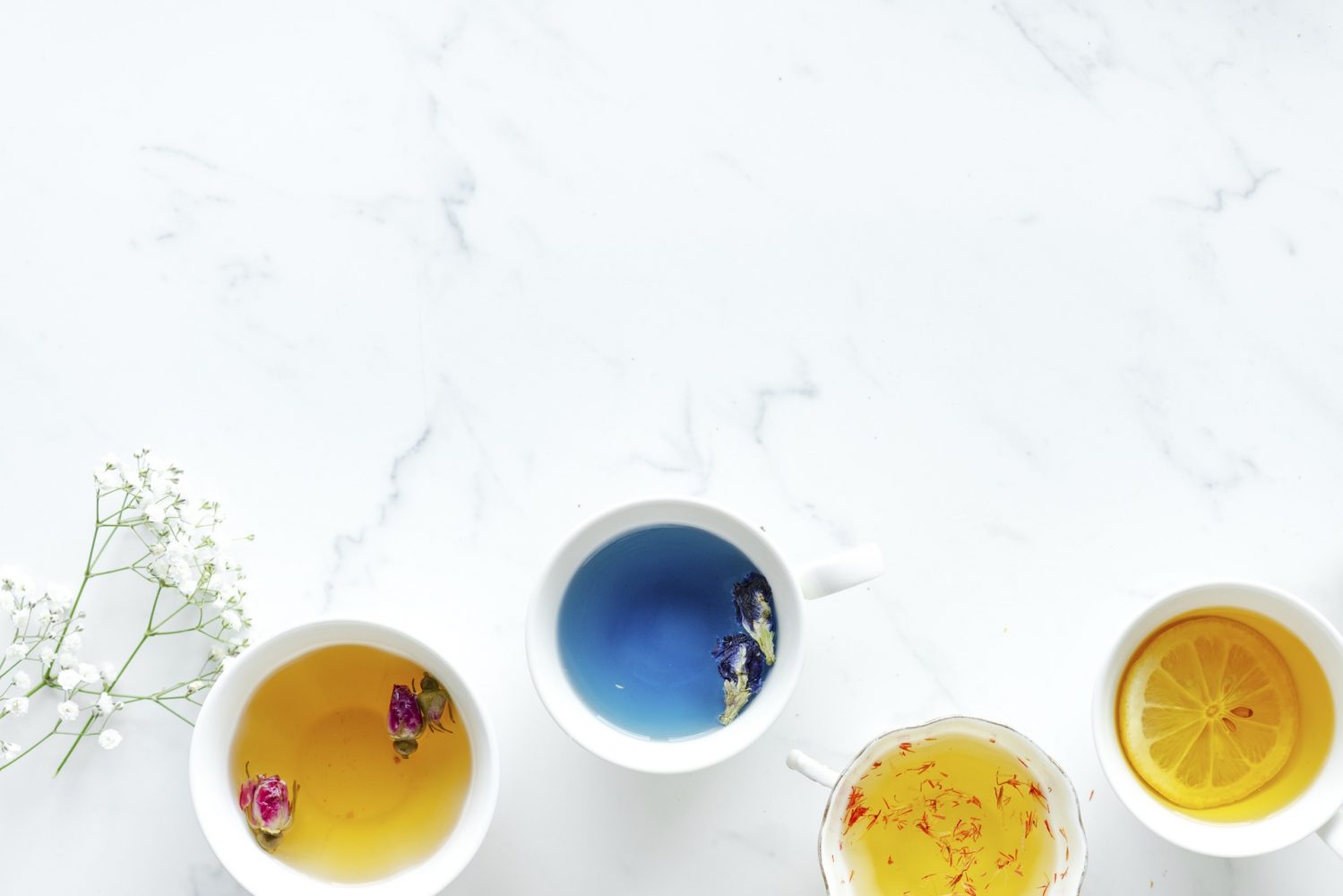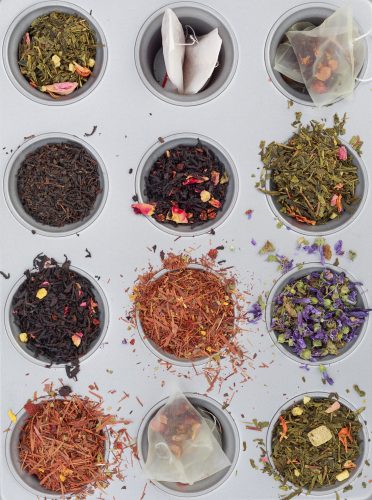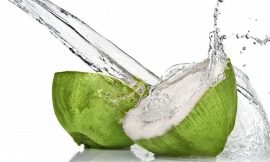Best 20 Herbal Teas & Their Health Benefits

Find the most effective and healthy herbal teas for your health and your wallet with this list of the best 20 teas.
1. Tea Leaves
There are said to be two different kinds of tea leaves, herbal and non-herbal teas. Herbal teas are brewed from herbs and fruit of many different types and combinations.Herbal teas are decaffeinated, and the health advantages of the brew are reported to depend upon the quality of the herb selected. Herbal teas have active ingredients called flavonoids, which are believed to be powerful antioxidants.
Antioxidants are reported to operate in cleaning up toxic forms of oxygen from cells.Herbal teas are reported to be very effective for warding off cancer, especially oral cancers, osteoporosis, and stomach ulcers. Old-age people who Commonly drink herbal teas are reported to have a 5% higher mean bone mineral density than non-herbal tea drinkers. Consuming herbal teas is related to lowering the risk of strokes in men.
There are many different types of herbal teas, below is a list of herbal teas and their known attributes.
2. Basil infusion
Basilis considered to be calming for the nervous system and to help in relieving nausea. Basil is reported to contain antiseptic and anti-depressant properties.
Basil is also said to be good at aiding indigestion.
3. Bergamot tea
Bergamot tea benefits have been documented for a long time. It is believed that the health benefits of this antioxidant-rich herbal beverage can be attributed to multiple compounds in its leaves and flowers.
Bergamot tea is a popular beverage, often consumed hot or cold. The health benefits of this drink have been well documented, which is why it is heavily recommended by many medical professionals and people with various diseases.
It is difficult to find a single compound in Bergamot tea that has the most beneficial effect on the body. Some people even believe that Bergamot tea can help with everything from allergies to depression.
4. Chamomile tea
Chamomile is reported to be one of the most relaxing herbs around. It is believed to be good to drink for preventing colds and to help in eliminating menstrual cramps.
The herbchamomile has been tried in the past as an anti-inflammatory, sedative, and also as an anti-ulcer supplement. Chamomilecontains high amounts of antioxidants and its rich oil content is said to make it an excellent antiseptic.Chamomile tea is caffeine-free, drinking it is said to help in lowering stress and it is reported to be good to have a cup ofchamomile tea prior to going to bed as it is believed that it aids a great night’s sleep.
5. Dill Tea
DrinkingDill teais said to be very helpful as it eases indigestion and helps regularize the system.Dill tea is also reported to help in relieving stomach aches and has been thought to be a good drink for people that may be suffering from insomnia.
6. Elderflower tea
Elderflower is considered to be beneficial for people suffering from colds, hay fever, and influenza. It has features that are said to help promote calmness and trigger a good night’s sleep.
7. Fennel seed tea
Fennel has a mild distinct aniseed flavor.Fennelis a diuretic and is said to have a calming effect on the stomach. ConsumingFennel teais reported to be excellent after a meal, as it is believed to help in aiding digestion and to be good for preventing bloating.
8. Green tea

Green tea is reported to help by enhancing the body’s ability to burn fat and help speed up metabolism, therefore drinking green tea may promote weight loss. Green tea is reported to help reduce cholesterol and protect against liver damage.
Green tea contains high amounts of antioxidants, which are said to help fight age, fight viruses, and kill free radicals in the body. It is believed to strengthen the skin’s defense mechanism as well as combat tooth decay.
Drinkinggreen tea is said to help boost the immune system, which may help ward off various illnesses. They are also believed to help combat both cancer and heart disease. Green teais said to lead to the production of serotonin in the body, which is thought to be a great source of energy.Green tea is also considered to be beneficial for fighting off depression, stress, and nervousness and promotes relaxation, calmness, and happiness.
9. Honey and Lemon Tea
Honey and lemon are reported to be beneficial for comforting a person. Drinking honey and lemon tea is considered to help soothe sore throats and combat coughs. Drinking lemon teais reported to help prevent skin cancer due to its citrus peel.
10. Lemon Balm tea
Lemon Balm tea contains many benefits. It has antioxidant properties to protect the liver, boosts immunity, and helps with menstrual cramps.
This tea is thought to be a great antidepressant. Drinking lemon balm teais said to be helpful for relieving tense headaches and indigestion. Its gentle sedative effect is said to be beneficial for calming anxiety.
Lemon Balm tea is one of the most popular herbal teas in Europe. It is known for its refreshing flavor and uplifting aroma.
Lemon Balm tea benefits include:
- Antioxidant properties to protect the liver
- Boosts immunity – Helps with menstrual cramps
11. Licorice root tea
Licorice tea is reported to help in alleviating many of the symptoms of headaches and anxiety, and to help in calming the nerves due to the therapeutic healing qualities it features.
Licorice root tea has also been studied for its diuretic effects because it induces the release of potassium in the urine when ingested. This effect is potent enough that licorice tea was used in European pharmacies to help with hydrating an athlete before the competition.
This ancient plant’s medicinal properties are what make it so popular in today’s modern society. From lowering blood sugar levels to fighting cancer cells this drink has proven to be highly beneficial when consumed regularly.
12. Passionflower tisane
Passionflowercontains sedative properties and is reported to help in relieving various nervous conditions such as insomnia and palpitations.Passionflower is reported to help by lowering anxiety, aiding good sleep, and enhancing blood thinning.
Passionflower is a common name for Passiflora incarnata and it can be found in many places around the world. It is also known as the passion vine, valerian flower, or mayweed. Many people use passionflower tisane to help with insomnia.
13. Peppermint tea
Peppermint tea benefits include its taste and properties such as its ability to relieve stomach discomfort, provide relief for minor stomach aches, help with digestion, and fight fatigue.
To give you a better understanding of what peppermint tea is all about, here are some of its benefits:
- Eases Digestion: Peppermint tea is said to stimulate digestion, which can be very handy on days when you’re feeling bloated.
- Provides Relief from Stomach Aches: As mentioned previously, peppermint improves the digestive system’s ability to break down food in the stomach. It also helps ease abdominal cramps caused by bloating or gas.
- Combat Fatigue: The caffeine in peppermint provides your body with an energy boost.
14. Rosehip tea
Rosehip tea benefits are numerous and can include improving skin, eye, and hair health. The antioxidants in this tea make it a good snack for those of us who want to reduce inflammation in our bodies. Its also been known to aid in weight loss.
Rosehip is a widely used ingredient among herbalists because it is rich in vitamins C and E which help the body defend against illness and inflammation. This helps keep disease at bay as well as protecting the skin from sun damage.
15. Rosemary tea
Rosemary teais thought to be an invigorating and refreshing tea. DrinkingRosemary tea is believed to be good for helping clear the head, easing depression, and helping an individual cope during bad times. It is also thought to improve blood circulation and treat headaches and respiratory problems. Rosemary also featurescalcium,which is very easily absorbed by the body.
- Rosemary has been used in natural remedies for centuries. It has many benefits including the ability to help with weight loss, skin care, and inflammation.
- Rosemary tea is made by pouring boiling water over dried rosemary leaves. It is best done in a teapot or other heat-proof cup/glass because you should not let the cup touch the hot water or it can crack.
- One benefit of this tea is that it helps with blood sugar levels, which can help prevent diabetes and heart disease.
16. Sage tea
Sage tea is a drink that has been consumed for centuries by many cultures. There are various benefits associated with sage tea, which is why it has been consumed for so long.
The herbsage has always been related to excellent health and lengthy life. Sage has astringent and antiseptic properties and is thought to be useful in helping to cure a sore throat. Consumingsageis also said to help in boosting insulin activity.
The consumption of sage tea can improve your mood, prevent chronic inflammation, relieve pain, reduce the risk of cancer and heart disease, improve your memory and increase energy levels.
Sage tea also has antioxidant properties that can help protect against damaging free radicals in the body. It can also help to neutralize toxins in the body and flush out harmful substances that have gathered over time.
17. Spearmint tea
Spearmint tea is believed to be an excellent tea for promoting digestion after a meal. This tea is not- an irritant and is a relaxing drink. It features both an uplifting and refreshing taste.
Spearmint tea is often associated with its medicinal properties that help in digestion, protect against some diseases, and more. Its benefits are numerous.
Spearmint tea has many health benefits which are attributed to the presence of spearmint oil. It also helps in relieving anxiety and stress levels. It can be made at home or bought from various retail stores across the globe.
18. St Johns Wort tea
St Johns Worttea was reported helping in relieving nervous tension and anxiety and in lifting depression. It is also said to improve an individual’s mood and general well-being. It is thought to be good for people suffering from seasonal affective disorder and to help people that may be suffering from insomnia, headaches, and exhaustion. St Johns Wort tea features flavonoids, Vitamin A, Vitamin B2, selenium, andhypericin.
With its anti-anxiety, anti-depression, and anti-inflammatory properties, St Johns Wort tea benefits are widely known. However, with the increasing rates of depression in the world, it is important to mention its actual effectiveness in alleviating symptoms.
St John’s Wort tea has been used for centuries by many people for mental conditions. For example, German scientists have found that 88% of patients with mild depression achieved at least a 50% reduction in symptoms after consuming St John’s Wort tea.
The use of AI writing assistants has increased over the years due to their increased efficiency and accuracy. For example, an AI writing assistant called ‘Pixate’ can create more than 300 articles per hour on any topic on demand.
19. Thyme infusion
Thymecontains strong antiseptic properties and is thought to be excellent for combating chest infections.Thyme teais reported to have a warming effect and may be used to help cool the stomach.
Thyme infusion tea is a herbal tea that has a unique flavor and a healing effect on the body. It has been used for centuries as an alternative to antibiotics because it can fight off bacteria, viruses, and fungi.
The thyme infusion tea benefits include helping with digestion, boosting the immune system, having antibacterial properties, and promoting weight loss. It also lowers cholesterol levels and boosts metabolism.
Thyme infusion tea is an excellent addition to your daily diet because it is easy to prepare and tastes great!
20. White tea
White teais now increasingly popular due to its taste and health advantages.White tea is from the camellia linens a plant and undergoes less processing in comparison to other herbal teas. White tea is not fermented or rolled and has less caffeine than other kinds of tea. It is very rich in polyphenol antioxidants, thought to help in combating cancer.
- Tests have shown that drinking White tea may stop DNA mutations, which are said to be the beginning steps toward cancer.
- Many cosmetic companies now are using white tea for producing skin creams.
Healthy Caffeine-Free Herbal Teas
Healthy Caffeine-Free Herbal Teas is content about the benefits of herbal tea. There are many health benefits to drinking tea, including weight loss and stress relief.
In this article, we would be discussing the various types of herbal teas that help you to lose weight as well as reduce stress.
One type of herbal tea is green tea which contains catechins and caffeine. Catechins slow down your metabolism and thus prevent you from storing fat in your body (obesity). It also helps in burning calories up to 30% more than regular coffee.
- (1). Green tea also has antioxidant properties that protect your cells against free radical damage
- (2). The antioxidant catechin polyphenols found in green tea predominantly act as powerful antioxidants for human health
Selection of Herbal Teas
Selecting the right herbal tea for your health is not an easy task. There are many factors to consider before you buy one. For example:
- how long will you be keeping it?
- What type of health benefits do you need?
- How much will it cost?
It can easily take hours of research before you find the right tea for you. That is where AI comes in. It uses machine learning to help with this process and can help locate relevant information without any manual input from the user.
There are many benefits to selecting herbal teas for health purposes. Some of the most common include alleviating stress, improving sleep quality, and promoting digestion.
There are hundreds of plants that have been traditionally used to improve health in different ways. To help you narrow down the list into a manageable number, there are some specific criteria that you can use when selecting herbal teas.
What are Herbal Teas’ Side effects?
Herbal teas are a natural way to treat a variety of ailments and they have been used for centuries. However, these teas come with a few side effects that you should know about before you drink them.
There are many different types of herbal teas that you can use to treat your health needs. However, as with any medicine, there may be some unwanted side effects as well. The following is a list of common side effects of drinking herbal tea:
- Nausea,
- dry mouth,
- constipation,
- diarrhea,
- stomach pain




